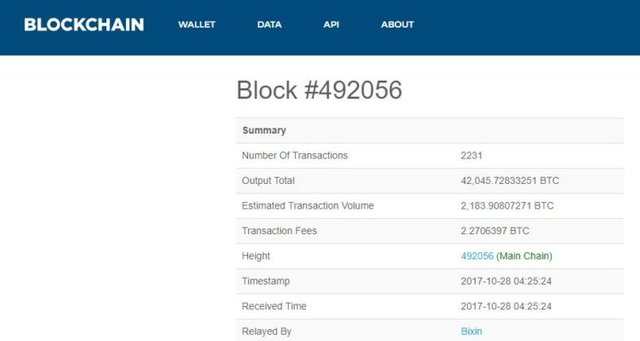
In the world of cryptocurrencies, transaction fees are one of the most talked about aspects. Being able to send funds from one place to another almost instantly and for a low cost has drawn in a great deal of users. But as time has gone on and Bitcoin has grown, so have its fees. This is led to multiple forks to the chain to lower fees and make it more usable for the masses, but they all miss one important part – the fees are a necessary evil.
How Miners are Compensated
Miners are compensated through two systems: block generation rewards and fees from transactions that are included within the block. For more information about how to pick fees and how they actually work, check out this article.
Now, combining the two systems together, we come up with a payment that looks like this (block chosen at random, #492056):
- .Block generation reward: 12.5 BTC
- .Fee reward: 2.2706397 BTC
From here, it looks like the fees are a very small part of the block (at around 15%). But every 4 years, that gets to be a bigger chunk. In 2021, for example, there would have been 6.25 BTC in the base reward, making the fees (theoretically) take up well over 33% of it. And as that base reward continues to shrink over time, fees have to make up for it. After all, if there are zero (or negligible) base rewards, miners rely entirely on fees.
Why Do Miners Need Fees?
Mining BTC comes at a cost – and it's a fairly big one. It's difficult to lock down on a number because there are so many variables, but as the difficulty rises, so does the cost. If miners aren't earning, it ends up costing money and netting losses, something that is bad from a business sense. While altruism is there, to an extent, keeping the network full of miners is important for network security. A great way to see this in action is to look at how many mining pools there are that just mine whatever is the most profitable. Or look at the swapping back and forth between BTC and BCH mining as they change profitability. As BTC becomes less profitable to mine, miners will move elsewhere. Furthermore, the big mining companies are working hard to keep their relative share of the hash power (and therefore the amount of control over mined blocks they have), so as the cost continues to rise, they put more and more money into buying new hardware and research/development.
Does Increasing Block Sizes Increase Total Fees?
This is something a lot of users get caught up on. If you've read the article on how fees are calculated, you likely realize that increasing the block size means more transactions can get in and there is less competition, therefore less fees on a per-transaction basis. Now, this is a two-sided ordeal. On one hand, it should increase per-block total fees because there will likely always be a little competition. On the other, the more competition there is, the higher the fees get driven. Ultimately, the goal shouldn't be to minimize fees for miners and get transactions out as cheaply as possible – in fact, it should be to find that perfect balance where it's cheap for the end-user and still nets the miners enough to keep them enticed. As we have seen lately, taking just one side or the other simply doesn't cut it: if the miners are upset, they quit mining, and if the end-users are upset, they start using other coins, either of which only work to the detriment of the cryptocurrency.
To that end, it's not to say that blocks should not be bigger than 1MB each, but rather that they should absolutely not be unlimited (as that means everyone can use almost nonexistent fees without issues) and users should realize that the fees aren't there to punish them for using the currency, but rather because they are essentially a necessary evil – without them, there is no Bitcoin.
As a newbie to crypto, this was really informative. Thank you! My question is why do other cryptos such as Litecoin have smaller fees? is it because they have bigger block size?
Downvoting a post can decrease pending rewards and make it less visible. Common reasons:
Submit
it's great but I recommend you to this website https://0bf34dfa.usi-tech.info/
Downvoting a post can decrease pending rewards and make it less visible. Common reasons:
Submit